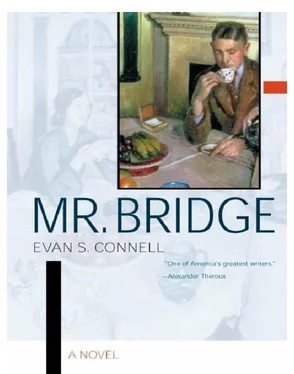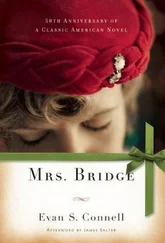Ruth was calmly buttoning her blouse, which was undone halfway to the waist. He gazed at her in disbelief. She ignored him and went on buttoning her blouse. He remembered that he had brought the gun; he looked at it and saw that it was in his hand, and the weight of it convinced him that he was awake.
“What were you planning to do?” she asked.
He put the gun in the pocket of his bathrobe and sat down in the nearest chair. It seemed to him that he had been a fool. He was a fool to suppose that he could prevent things like this from happening.
Ruth went on in the same sardonic voice: “He begged me to go to a hotel, but I wouldn’t. So here we are. Here we are, you and I.” She crossed her arms and looked down on him with an expression of indifference or contempt. “Promise me one thing. Don’t let Mother know. It would probably kill her.”
Mr. Bridge realized that he was attempting to cry, but he had not cried since he was a child. He began to cough.
“Things are different now,” she said, and she approached and brushed his ear with the tip of her little finger, but her face was hard. Her eyes were not asking forgiveness.
“No,” he said, shaking his head. “Some things never change. Love and respect and human decency — these never change. Your mother and I have these things.”
“Good for you.”
“No,” he said firmly. “Without these none of us could go on living.”
Ruth shrugged. She did not seem to be listening. He looked up at her helplessly.
“What about this man? Are you planning to be married?”
“Oh God,” she murmured with a gesture of impatience. “I never saw that ass before tonight. Times have changed since you were young.” Then she added, “And besides, you’ve probably forgotten how it used to be.”
He shook his head again. “I have not forgotten what it means to desire a woman. I am still able to feel great desire for your mother.”
“I don’t want to talk any more,” she said. “I’m exhausted. I’m going to bed.” She ran out of the room and up the steps.
For three days Mrs. Bridge had been in bed with a cold. Now she was well enough to receive visitors, though she remained upstairs. Most of her friends came by bringing a book or flowers or some fresh fruit, and among these visitors was Mildred Cox, who had moved into the neighborhood only a few weeks earlier and whom Mrs. Bridge did not know very well.
When Mrs. Cox departed, Carolyn, who saw her to the door, returned to the living room and remarked in a voice nearly indistinguishable from her mother’s: “Well, wasn’t that sweet!”
Then Ruth said, “I am so sick of that word. She’s sweet. It was sweet. Now wasn’t that sweet? Everything is sweet. Shit!”
Carolyn looked immediately at their father.
He was in his chair beside the fireplace. On his lap lay a vacation brochure from the Manitoba tourist bureau and he had been thinking about a fishing trip next summer. This agreeable prospect, together with the flames crackling around the logs and the autumn wind humming beneath the eaves of the house, had lulled him so that at first he did not hear what Ruth said. At last he lifted his head to look at her. From the emphasis she had placed on the word he knew she had said it deliberately. She was defying him. In the firelight her oblique eyes were glittering. She had never been more beautiful. He was shaken by the sight of her, and he knew he loved her in a way he could not ever love the other children, perhaps because she was the first, or because of the strange darkness in her which he could feel also within himself.
“We will have no such language in this house,” he said. He thought he saw a flicker of amusement on her face before she turned away.
There was more silver that Christmas, and silver pleased Mrs. Bridge more than anything else. Through the years she had bought a good many items of silver, and for her birthday and on her wedding anniversary and every year at Christmas she received other silver articles, so that the house was getting fairly full of silver. To Mr. Bridge it looked like a shop. There was silver just about everywhere. In the dining room a pair of elaborate silver candelabra with spiraling arms stood on the cherrywood cabinet, where the best silverware was kept. Between the candelabra rested a large rectangular silver platter on which there was an antique-silver coffee urn, a chased-silver cream and sugar set, an ornamental-silver ladle, and a triangular silver cake knife. On the opposite side of the dining room stood a long Chippendale serving table, which was almost never used for that purpose, but which functioned as a display table for an eighteenth-century silver wine mug with a gold stem, a silver bonbonnière, a blue-enamel cigar box with silver filigree, a nutcracker, an inkstand, a condiment set, a snuffbox, a pitcher, a Revere tray, two vases and several pieces of cutlery. In the kitchen Harriet maintained a supply of the necessary serving trays and bowls, covers and compotes, utilitarian knives, spoons, forks, ice tongs, the ice bucket, and a few other articles. Of course there was silver elsewhere in the house. Silver could be found upstairs and downstairs. In the basement recreation room was a silver whisky decanter she had discovered at an auction, and another platter, and a tea tray which she did not like very much, and another cream-and-sugar set, a pair of nut or mint dishes shaped like swans, and a drawer full of knives and forks and spoons. In the master bedroom on the chiffonier stood another set of candelabra, which he did not like very much, though he said nothing about it. In the breakfast room there was silver, in the hall hung an oval mirror with a fantastic silver frame, and in the living room was quite a lot of silver. And while opening the back hall closet in search of a sweater he had not worn for a long time he came upon a silver vase hidden like a lost Easter egg behind a hatbox. Mrs. Bridge had forgotten about it, too, but she was pleased that he had found it. She polished it herself, and then she arranged a place for it on the mahogany sideboard next to a tiny silver bell with a delicate tone.
As usual, many of the Christmas presents that year were silver. A carving set from the Montgomerys, who evidently did not remember that they already owned three such sets. A soup tureen from the Barrons. A client of Mr. Bridge, hearing that his wife liked silver, stopped by on Christmas Day with two dozen sterling cocktail picks. From another client came a heavy silver picture frame. From the Van Metres, an engagement calendar with a silver lid. A brooch from the Beckerle sisters. Avrum Rheingold, keeping his finger on the pulse of Mr. Bridge like the shrewd doctor of stocks that he was, took the liberty of sending her a silver-plated fish knife together with his best wishes for a happy and prosperous New Year. Mrs. Bridge was delighted.
After the holiday debris had been cleaned up and papers and boxes and ribbons were burning cheerily in the fireplace and Harriet was going over the carpet with the vacuum cleaner, Douglas took time off from his own presents to survey his mother’s latest acquisitions. She had, he said, made out like a burglar, and Mr. Bridge privately agreed.
Feeling the need of some sort of moderate physical activity, Mr. Bridge decided he would clean out the garage. After changing into old clothes he put on his fishing hat and a pair of cotton gloves and walked through the kitchen, where he paused just long enough to sample a kettle of turkey soup simmering on the stove. Then he stepped outside and inhaled deeply. A high veil of clouds grayed the sun and the wind blew steadily from the north. He clapped his hands to frighten some chickadees hopping around on the frozen earth and proceeded to the garage in good humor, amusing himself by walking into his breath which was visible in the wintry air.
Читать дальше












